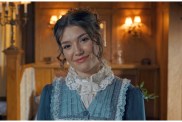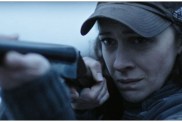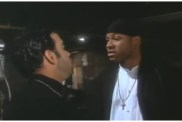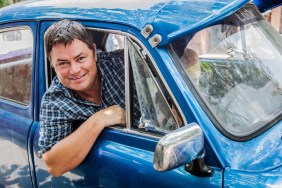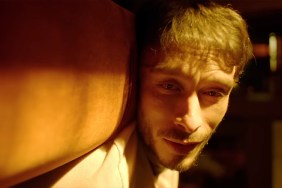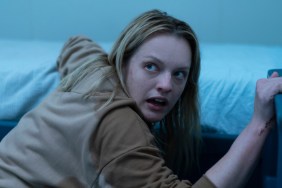Every time Javier Bardem appears on screen it tends to be something special, but in Biutiful, the new film from Babel director Alejandro González Iñárritu, he knocks one out of the park with a performance that’s as emotionally dynamic as The Sea Inside and Before Night Falls.
This time, Bardem plays Barcelona street hustler Uxbal, who has a lot on his plate already when he learns he’s dying and has to find a way of making amends with his chosen lifestyle, spending as much time with his two young kids as possible while contending with a bipolar wife (newcomer Maricel Alvarez) and a number of work-related issues that drive him to feel even greater guilt about his chosen profession. It’s another beautiful film from Iñarritu, but there’s no question that the movie would not have been the same without Bardem on board to develop Uxbal into another memorable film character.
ComingSoon.net sat in on a roundtable interview with the actor last month.
Q: Did Alejandro mention that he wrote this film specifically for you?
Bardem: He told me that, but he’s also a very wise man. He said, “I wrote this with you in my mind, but you are free to decline it.” There is a lot of pressure when they tell you that they wrote this with you in mind. I’m like, “Oh, I cannot say no to this,” but he’s wise and he said, “You can do it and somebody else can do it also. I would like you to do it.” I read it and I’m a huge fan of his work and some of the greatest actors of all time have worked with him and have done some of their best work with him, so as an actor I was really interested in the process of how this man brings out some of the best performances of some of the best actors. I know why. It’s working really hard and putting you against the wall in a good way. He works hard. He doesn’t stop. The material and what he proposes to you is a life journey. It’s not a performance. It’s like, “Do you want to jump in with me or not? You decide.” I decided I would among many other things because of the things that I was talking to you about, that this is worth it. This for me is worth making for people to see.
Q: I know this role affected you deeply. Can you talk about how?
Bardem: In many ways, I guess. It was a long shoot; it was five months. I think on a movie set you have to always be in tension. You have to create something yourself where you are totally aware, but also create relaxation in that awareness. Otherwise, you’ll be a very tense actor, but you can’t ever lose the track, because you never know when they are ready to shoot. To be in that state for so long with such heavy material is exhausting. It’s not that I lost certain things, although I lost myself in very dramatic things, but it’s just that you see yourself disappearing more and more from what you know you are and becoming more the person that you created. That’s not to say that I was suffering what he suffered–I’m not him–but it is to say that there is no room for anything else other than being him. Because you’re portraying somebody like him who goes through so many personal journeys, emotional, heavy ones there’s no way that you can escape, to be honest. So the transformation was from being an actor and trying to pretend to be someone else to becoming that person for a good three months. I’m not him. Thank God I’m not him. I don’t know the way to portray that without putting yourself in that place, but that’s what we do. That’s our job. Some characters are easier. “Eat Pray Love,” you go there and you have fun. The tone of that movie and others are different, they really left some marks on your skin and this is one. It’s for sure the hardest that I’ve done.
Q: Were there parts of the city that you went into that enhanced the character for you?
Bardem: Yeah, I live in Spain. I live in Madrid. Barcelona is like Madrid, London, Paris, New York. I mean, it’s not only in Barcelona these things happen. They happen all around, but I have awareness. I had awareness of how the world is going on in those cities about immigration and all these illegal factories that are treating people like modern slaves, but that’s intellectual. Somehow you heart it. You see it from a distance. You read about it. In this case you are obliged to live with it and so I spent like a good month in those places with those people, talking to them and what’s more important, listening to them. Then the experience becomes personal, becomes an emotional experience rather than an intellectual experience. That’s the difference between having comprehension about an issue or really being affected by that issue. So after the movie of course my awareness of the whole ambiance of those worlds is much more powerful. I wasn’t surprised because there’s a lot of things going on in the backyard of any big town and Barcelona is no different from that.

Q: Afterwards did you want to get more involved with these people and perhaps help them in their fight?
Bardem: Yeah, well, that’s not that easy. I mean how do you help people that are really in the bottom of their existence because we don’t allow them to have sometimes even the rights to express? You can do things, but it’s about putting, for example, this movie out there and making people realize that there is something that we have to pay attention to which is the world that we create. I think our very comfortable way of life has constructed or is based in the misery of a lot of people. Just the awareness of it means a lot to them and this movie is important for that among many other things, but for me, for everybody. For me it’s important to put this out there. For example, people in Barcelona or in Spain, in the world will see that behind those numbers that show up in the paper are people. There are people with needs and it’s important for them to see Uxbal, a Spanish person, goes through the same problem of necessity as a person from Senegal. So in the end they are both the same. So it’s not about color or race or origin. It’s about people.
Q: Did you physically transform throughout this movie or did you take time off to lose the weight?
Bardem: It was a lot of diet, a lot of exercise, but also a lot of shooting that really makes you feel like losing weight.
Q: Can you talk about shooting chronologically and the length of the shoot, and what that took out of you?
Bardem: Alejandro told me in the very beginning that it was going to be chronological and I thank him for that because it would be a mess otherwise. It would be impossible. There’s an arc very well described that has to happen and it sustains little details. There’s something big which is the disease going on and the effect that it has on the mind, the body, the soul, but also little details of behavior that have to do with the chronological order of being affected by that. It’s a great luxury for any actor, but I couldn’t imagine doing this any other way. I don’t know if it would’ve been impossible, but it would’ve been extremely difficult for everybody.
Q: And working for that period of time?
Bardem: It’s the longest movie I’ve done so far, it has to be this one.
Q: How do you get out of that role after being with it for so long?
Bardem: You don’t. They say, “Okay, wrap it up,” and you say, “Okay, what do I do with this now?” You have to go there and let it go out by time. There are certain roles, like when I did “Before Night Falls” or “The Sea Inside,” based on real people, great human beings, both of them in different ways, but great people. They sacrificed their lives in order to say something to somebody, to all of us actually and when they say wrap it up you have to do a process of letting go. In a way you’ve been calling them towards you, like, in spirit and they show up. Beyond your belief or not, it’s about that. It’s about something that you feel, like, “Okay, he’s here and he allows me to do it.” Sometimes you feel like, “What would he think?” And when those things are going and you’re in love with them for what they represent it’s hard to say goodbye, but it’s also a nice thing because it’s like, “Thank you for allowing me to be you.” In this case it was different. It was like we created this out of nothing, out of nowhere and it’s difficult to detach from something that you have created because it has a lot of you in there. When you do “Before Night Falls” or “The Sea Inside” there’s him in there. It’s a different process.
Q: I bet you slept for a year after this film…
Bardem: Yeah, I did.
Q: Can you talk about working with Maricel Alvarez, the Argentine performance artist, and how what she did influenced you as an actor?
Bardem: Yeah. She’s totally opposite [to her character]. She’s very healthy in every way. Alejandro and I, we read a lot of actresses from Spain for that role. We put ourselves in a room for hours and hours, days and days and some of the greatest actresses in Spain showed up and they did a great job. But this character is not a simple one. You have to really be able to go on an emotional roller coaster that easy. From one second to another you are a different person. It’s based unfortunately on a real disease called “bipolar.” All of them did a great job and then she showed up, the last one, and actually Alejandro thought that we were going to stop the whole process and give ourselves a good two or three months to keep on searching, looking for the actress. So she was the last hope. She showed up and she did the scene and we were both like shaking. She hadn’t done a movie before but who cares. She’s an amazing actress and her approach to it was amazing. It was like a tennis game, throwing the ball to each other.

Q: Did you have to change your approach to the role because of her performance?
Bardem: No, no, no. I think all actors are the same. We want always to create somebody else. The way to get to that is different in everybody, in each person, but the object is always the same for everybody. I’m talking about people who really want to do that. Some people don’t care and that’s fine. They do great jobs, but this is not the movie for that.
Q: What about working with those two kids?
Bardem: Well, as you were saying, that was the first time that they were on a movie set. Alejandro and I talked very seriously. One of the most serious things that we took in this movie was, “We have to protect those kids. We want to make sure that those kids know in every moment that we’re doing fiction,” because they’re going to see things. They’re going to have images like their parents having a fight with one son in the middle being pulled off. That’s very hard for a six year old. So that was exhausting because the director and I, we tried to give a lot of attention to that, but the director is directing which is a lot of things. That’s why I’m not a director. He has to answer so many questions. I was with the kids and I was trying to be there, playing with them, doing kid things, and then he would say “action” and we would get into the fiction. They would do it so easily and so well it made me think, “That’s the way to go.” That’s the way that it should be, but it was hard for me because I had to be on both sides. There’s going to be a fight with my wife. It’s going to be a f*cking hard scene and I have the feeling here that it’s going to be… but you have to create that fiction. And at the same time you’re doing this for them. That was very exhausting and so when I saw the kids on set I was like, “Oh, God,” but the same time it was very rewarding because I don’t know the purity of how they played the game without any weight on it. It was like, “Thank you,” because they taught you how to do it.
Q: What do you have coming up next?
Bardem: I did a Terrence Malick movie, but I cannot speak a lot about it because I’m not allowed, and second of all because I don’t really know, but I have to say that it was an amazing, extraordinary experience, a unique experience.
Biutiful opens in select cities on January 28. Read our interview with filmmaker Alejandro González Iñárritu here.
Photo of Javier Bardem by Brad Balfour.
